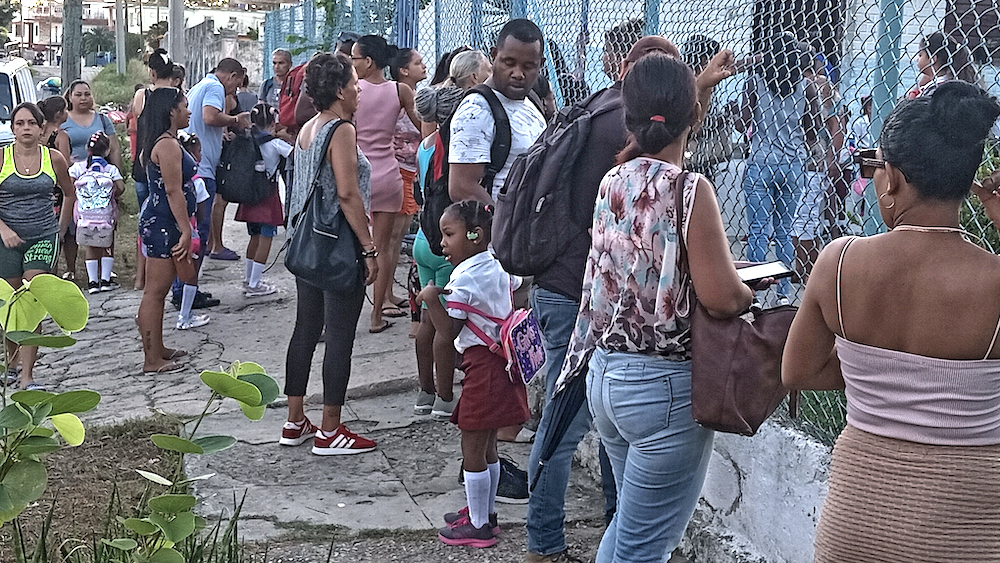On September 1, three days before the start of the 2023-2024 school year in Cuba, Holguin mother Yenys Fernández complained that her daughter and her primary school classmates would begin classes in a "classroom" that, in reality is a warehouse under construction. The images that Fernández posted on Facebook show the rubble of the construction work in progress and the considerable distance that the children will have to cover to reach the bathrooms.
Fernández's daughter is one of the 1,600,000 students who began classes on September 4 at the more than 16,000 schools across Cuba, at an "exceptional" time due to economic circumstances on the island, as acknowledged by Education Minister Naima Ariatne Trujillo Barreto during the official inauguration ceremony, reported on by state media.
Comparing the return to school to "a party," the authorities celebrated the return to in-person normality after the Covid-19 pandemic, though they immediately rushed to play down the conditions existing at this time.
"It is, at least, the normality that the economic challenges allow us, as they impact Education too," the host stated on the state TV program Con Filo.
For years schools in Cuba have been the opposite of the free, high-quality education that the propaganda alleges, with the 2023-2024 school year marking one step further in its deterioration.
Families have become accustomed to paying private tutors so that their children receive better educations and can enroll in college. Schools are dilapidated, as reflected in the accounts of Cuban mothers published by DIARIO DE CUBA in February.
In addition to a shortage of teachers, which has marred the beginning of each school year for years, there is a lack of textbooks, notebooks and notepads. For families, the norm now will be to pay exorbitant prices for those materials, which, until last year, were provided by the Ministry of Education.
The Education Minister admitted, on the Mesa Redonda television program, that the year began with an acute lack of materials, and that it has not been possible to produce all those necessary.
According to Andrei Armas Bravo, General Director of Education in Sancti Spíritus, in that province the lack of textbooks means that two students will have to share books in some subjects.
"We have decided that, at some educational levels, there will be a book for every two students, with priority assigned to students who live far away. In this way we'll be able to move forward in the teaching/educational process," the official told the local official newspaper Escambray.
For some time Cubans' hunger, generated by an acute economic crisis, and one of the highest inflation rates in the world, has meant a source of revenue for businesses that transport food to homes on the island, paid for from outside by their emigrant relatives. Now the missing textbooks, notebooks and notepads in Cuba will constitute additional items for which people will depend on help from those in the community of Cuban exiles abroad.
The Destino Cuba (Destination Cuba) page offers shipments of "school baskets" for boys and girls for 60 euros; for those over 14, 65 euros. The baskets contain a backpack, notepads, and pens and pencils, among other items.
On Cuba, the crisis has paved the way for MSMEs and private businesses to offer these items at prices that most people cannot afford.
On the Santa Clara Snapshots (Instantáneas) Facebook page a user was shocked by the prices advertised at a private business, showing them in a photo: a school notebook cost 250 Cuban pesos —more than 10% of the minimum wage in Cuba (2100 pesos), and one for high school or university students cost 600 pesos.
For families, having to pay high prices, or hope to be sent help from abroad, does not mean that education in Cuba is no longer free —because, in fact, it never really was.
The relationship that has always existed between Cubans' meager salaries and "free services" is recognized in Article 31 of the Constitution approved in 2019, which states that "the remuneration provided for work done includes and accounts for the defrayal of universal social services and other benefits."
What is happening is that it is now clear that Education is not a priority for the regime, despite the place it occupies, along with Health, in its rhetoric on the Revolution's triumphs.
The budget allocated by the State to Education in recent years shows no significant reductions, but neither have there been increases offsetting the current economic realities of households and the inequalities they are generating.
The average salary in the Cuban state sector is 3,828 pesos per month (31.12 dollars, at the official exchange rate of 123 pesos per dollar) and the minimum wage is 2,100 pesos (17.07 dollars). A doctor earns just over 5,000 pesos per month, and a research scientist, 5,560.
In contrast, the private sector offers salaries that exceed 10,000 pesos per month, and at some MSMEs engineers and architects can earn 25,000 pesos per month.
To explain the lack of resources for the Education sector, the regime points to the embargo, the go-to scapegoat constantly invoked by the Cuban authorities and the state press.
The embargo, however, has been no obstacle to the construction of hotels and tourism facilities. While in the first half of 2023 the Business and Real Estate Services sector (which includes buildings for tourism) received 10.406 billion pesos, Education only obtained 559.8 million, according to a publication by the National Office of Statistics and Information (ONEI). This represents less than 1% of what the State allocates to hotels.
